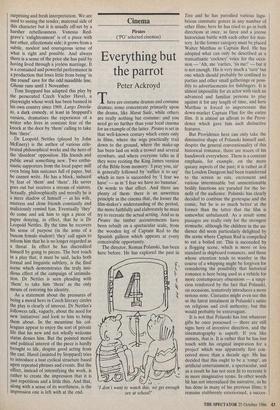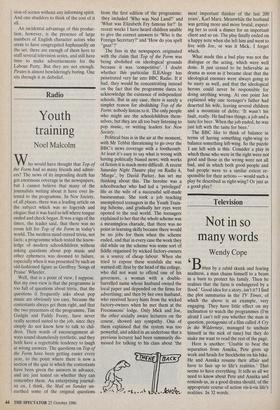Cinema
Pirates ('PO' selected cinemas)
Everything but the parrot
Peter Ackroyd
There are costume dramas and costume dramas; some concentrate primarily upon the drama, like Marat Sade, while others are really nothing but costume: and you need go no further than your local cinema for an example of the latter. Pirates is set in that well-known century which exists only in films, where the wigs practically trail down to the ground, where the make-up has been laid on with a trowel and several crowbars, and where everyone talks as if they were reciting the King James version of the Bible from memory: 'I pray you, sir' is generally followed by 'suffice it to say' which in turn is succeeded by 'I fear we have' — as in 'I fear we have no bananas'. Or words to that effect. And there are plenty of them: there is an unwritten principle in the cinema that, the looser the film-maker's understanding of the period, the more faithfully and elaborately he must try to recreate the actual setting. And so in Pirates the timber accoutrements have been rebuilt on a spectacular scale, from the wooden leg of Captain Red to the Spanish galleon which appears at every conceivable opportunity.
The director, Roman Polanski, has been here before. He has explored the past in 'I don't want to watch this, we get enough sex at school!' Tess and he has parodied various lugu- brious cinematic genres in any number of other films; here he has tried to go in both directions at once, as farce and a jocose historicism battle with each other for mas- tery. In the former category must be placed Walter Matthau as Captain Red. He has adopted what can only be described as a transatlantic 'cockney' voice for the occa- sion — `Ah, me 'earties, 'tis me!' — but it is not enough. His is very much a 'turn' but one which should probably be confined to parties and other small gatherings or poss- ibly to advertisements for fishfingers. It is almost impossible for an actor with such an advanced and familiar persona to play against it for any length of time, and here Matthau is forced to impersonate this down-market Captain Flint for the entire film. It is almost an affront to the Provi- dence which gave him such distinctive features.
But Providence here can only take the diminutive shape of Polanski himself and, despite the general conventionality of this historical romance, there are traces of his handiwork everywhere. There is a constant emphasis, for example, on the more queasy aspects of the past; it is rather as if the London Dungeon had been transferred to the screen as rats, excrement and various interminable but unmentionable bodily functions are paraded for the be- nefit of the audience. Polanski has clearly decided to combine the grotesque and the comic, but he is so much better at the former than the latter that the film is somewhat unbalanced. As a result some passages are really only for the strongest stomachs, although the children in the au- dience did seem particularly delighted by the scene where Captain Red is compelled to eat a boiled rat. This is succeeded by a flogging scene, which is more or less standard in shipboard romances, and those whose attention tends to wander in the course of a whipping might be forgiven for considering the possibility that historical romance is here being used as a vehicle for more contemporary obsessions — a suspi- cion reinforced by the fact that Polanski, on occasions, tentatively introduces a more serious note. Cineastes might even see this as the latest instalment in Polanski's satire on religious and civil authority; but this would probably be extravagant.
It is not that Polanski has lost whatever gifts he once possessed — there are still signs here of inventive direction, and the cinematography is superb. If you like sunsets, that is. It is rather that he has lost touch with his original inspiration for a project which was apparently first con- ceived more than a decade ago. He has decided that this ought to be a 'romp', an artificial entertainment, a spectacular, and as a result he has not seen fit to recreate it in more imaginative terms. In other words We has not internalised the narrative, as he has done in many of his previous films; it remains stubbornly exteriorised, a succes- sion of scenes without any informing spirit. And one shudders to think of the cost of it all.
An incidental advantage of this produc- tion, however, is the presence of large numbers of English character actors who seem to have congregated haphazardly on the set: there are enough of them here to staff several television series, and still have time to make advertisements for the Labour Party. But they are not enough. Pirates is almost bewilderingly boring. One sits through it in disbelief.



























































 Previous page
Previous page